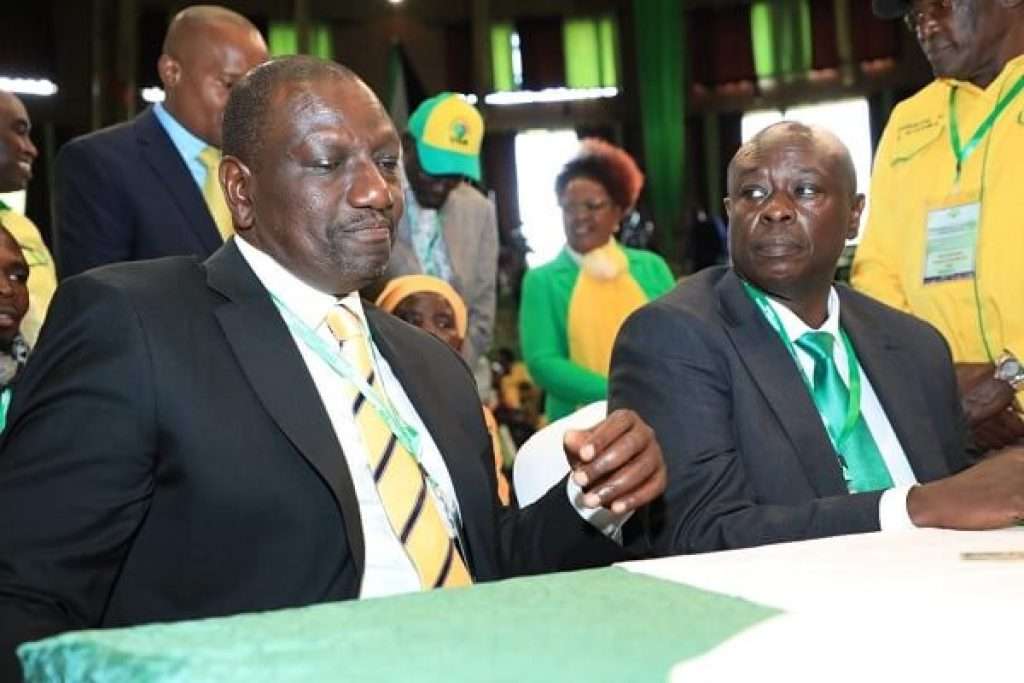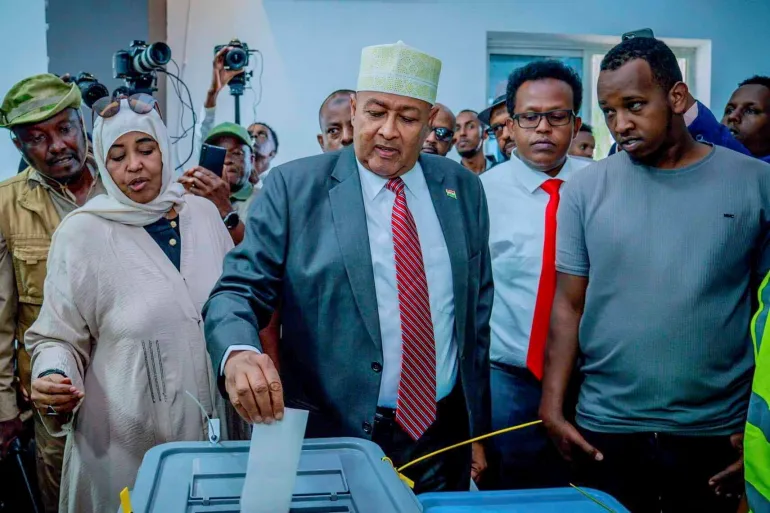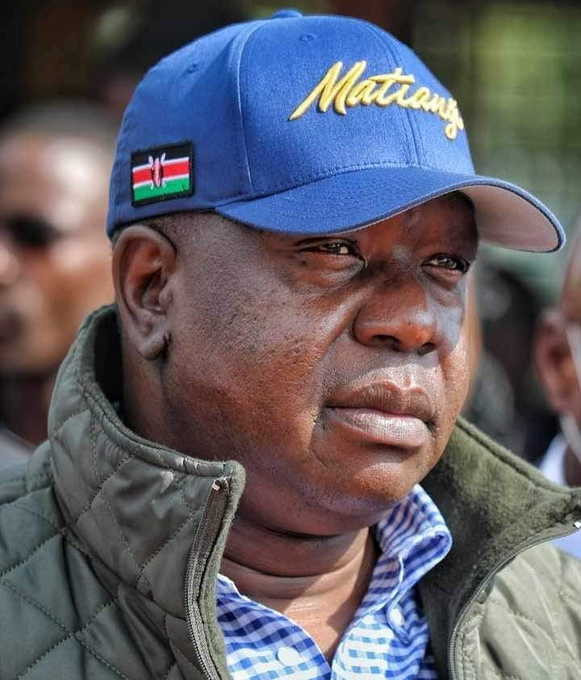Politics
Ruto-Gachagua Power Struggle: Impeachment and ODM Ties
As tensions rise, the fate of the Ruto-Gachagua partnership hangs in the balance. The impeachment motion signifies a pivotal moment for both leaders. For Ruto, removing Gachagua could solidify his control over the administration, enabling him to realign his agenda without the ongoing conflicts posed by his deputy. However, this course of action carries the risk of alienating the Mt. Kenya region, an essential voting bloc, and potentially fracturing the Kenya Kwanza coalition.

: Explore the complex relationship between President William Ruto and Deputy President Rigathi Gachagua, highlighting their 2022 presidential journey, emerging controversies, ODM member involvement in the administration, and implications for Gachagua’s potential impeachment.
By Charles Wachira
The political alliance between President William Ruto and Deputy President Rigathi Gachagua, once hailed as a formidable partnership that reshaped Kenyan politics, is now on the verge of collapse.
Their journey from allies to adversaries mirrors the complexities of Kenya’s political landscape.
The growing rift between them has been fueled by internal power struggles, policy disagreements, and the recent integration of members of the opposition Orange Democratic Movement (ODM) party into the Ruto administration.
This move, combined with Ruto’s recent pledge to have a female deputy president in the near future, has raised questions about Gachagua’s political future and hints at a calculated effort to pave the way for his potential impeachment.
This analysis delves into the origins of Ruto and Gachagua’s partnership, their shared interests, their victory in the 2022 presidential election, and the controversies that have led to their falling out.
We also explore the role of ODM’s inclusion in the government and the implications of Ruto’s promise to elevate a female deputy president in light of the impeachment motion against Gachagua.
Ruto and Gachagua: A Strategic Alliance
William Ruto and Rigathi Gachagua’s paths first crossed in Kenya’s political circles during the late 1990s and early 2000s. Ruto, a rising star in Daniel arap Moi’s government, and Gachagua, an influential figure within the government administration, shared common political goals.
They both opposed the dominance of Raila Odinga’s opposition and worked toward securing influence within their respective communities—Ruto from the Kalenjin community and Gachagua from the Kikuyu heartland. Their partnership was not based on friendship but on pragmatic political calculation. Together, they recognized the potential of uniting their support bases to create a formidable political force.
The 2022 Presidential Victory: A Tactical Success
In the lead-up to the 2022 general election, Ruto and Gachagua formed the Kenya Kwanza Alliance, a coalition that promised to deliver economic reforms through the “bottom-up” economic model.
Their campaign successfully mobilized Kenya’s rural and lower-income voters, with Gachagua serving as the key figure in securing the Kikuyu vote, while Ruto appealed to the broader “hustler” narrative that resonated with millions of Kenyans.
The pair won a hard-fought victory against Raila Odinga’s Azimio la Umoja coalition, capitalizing on growing discontent with the status quo and frustrations with then-President Uhuru Kenyatta’s administration.
However, this victory masked the underlying tensions that would later surface in their working relationship.
Rising Tensions: Policy Disagreements and the Finance Bill 2024
Despite their electoral success, tensions between Ruto and Gachagua began to surface shortly after they took office. A key point of contention was the distribution of power within the government.
Gachagua expected to wield significant influence over regional appointments and key policy decisions, particularly in the Mt. Kenya region, but Ruto’s approach to consolidating power did not sit well with his deputy.
The passage of the Finance Bill 2024 became a flashpoint. The bill introduced controversial tax hikes that disproportionately affected ordinary Kenyans, and while Gachagua staunchly supported the bill, Ruto distanced himself from its more unpopular provisions.
Gachagua’s alignment with the bill further eroded his public image and made him a target of criticism, especially among the very voters who had propelled Kenya Kwanza to victory.
ODM Integration into the Ruto Administration: A Calculated Political Move?
In mid-2023, President Ruto made the unexpected decision to bring members of the ODM opposition party into his government.
Initially seen as a gesture of unity, the move has since been interpreted as a strategic maneuver to shore up his parliamentary numbers and weaken Gachagua’s influence within the government.
By offering key positions to opposition figures, Ruto created a broader coalition that diluted Gachagua’s power and influence.
The most significant interpretation of this move, however, is its potential connection to a brewing impeachment motion against Gachagua. Mwengi Mutuse, an MP who was once a Gachagua ally, spearheaded the motion, citing gross misconduct and allegations of corruption.
Without sufficient parliamentary backing, the motion would have little chance of success, but with ODM members now aligned with Ruto’s administration, the president may have quietly amassed the numbers necessary to oust his deputy.
Ruto’s Pledge for a Female Deputy President: Signaling a Shift?
On March 7, 2024, President William Ruto made a pronouncement that added further fuel to the fire of speculation surrounding Gachagua’s future. Ruto pledged to ensure that his party would have a female deputy president in the near future, a statement that was widely viewed as a signal that Gachagua’s time in office may be nearing its end.
This pledge came at a time when the rift between the two leaders was becoming increasingly public, and it hinted at Ruto’s possible plans to reshape his administration.
The timing of Ruto’s announcement cannot be overlooked. Coming just as the impeachment motion against Gachagua gained traction, the promise of a female deputy president appears to serve multiple purposes.
On one hand, it positions Ruto as a progressive leader committed to gender inclusivity, while on the other, it subtly sets the stage for Gachagua’s potential removal from office. Should Gachagua be impeached or forced to step down, Ruto’s promise would allow him to fill the vacancy with a politically advantageous candidate, possibly someone who could consolidate his control and appeal to a broader electorate.
The Impeachment Motion: An Open Secret
By early 2024, whispers of Gachagua’s impending impeachment had grown louder. The motion, led by Mutuse, accused Gachagua of misconduct, including corruption and overstepping his constitutional role.
Despite Gachagua’s continued support among some Kikuyu leaders, his national standing had weakened significantly due to his controversial policies and abrasive leadership style.
Ruto’s integration of ODM members into the government was seen by political observers as a means to secure the parliamentary majority required for such an impeachment to succeed.
If successful, Ruto would not only rid himself of a troublesome deputy but would also have the opportunity to realign his administration to better suit his long-term political goals.
The Way Forward: Reconciliation or Rupture?
As tensions continue to escalate, the future of the Ruto-Gachagua partnership remains uncertain. The impeachment motion represents a defining moment for both leaders. For Ruto, ousting Gachagua could strengthen his grip on power and allow him to refocus his administration’s agenda without the constant friction from his deputy.
However, such a move risks alienating the Mt. Kenya region, a crucial voting bloc, and could fracture the Kenya Kwanza coalition.
For Gachagua, the impeachment battle may be his last stand. If he can rally enough support within his community and Parliament, he may survive the motion and regain some of the influence he has lost.
However, if Ruto’s parliamentary maneuvers succeed, Gachagua’s political career could come to an abrupt and ignominious end.
In the meantime, Ruto’s promise of a female deputy president hangs over the political landscape like a sword of Damocles, signaling that change is on the horizon. Whether this change comes through reconciliation or a complete rupture in the Ruto-Gachagua alliance will determine the future course of Kenya’s political leadership.
The integration of ODM members, the impeachment motion, and the promise of a new deputy president all point to a pivotal moment in Kenyan politics, one that will have long-lasting repercussions for both the country and its leaders.
Keywords:Ruto-Gachagua rift:ODM integration in government:Deputy President impeachment Kenya:2022 Kenya election victory:Female deputy president Kenya
Politics
Martha Karua’s Memoir: A Journey of Leadership and Resilience

: Discover Martha Karua’s memoir, Against the Tide, as she reflects on her
political career, struggles, and triumphs in Kenya’s fight for justice and
leadership.
Martha Wangari Karua, born on September 22, 1957, in Kirinyaga District, launched her
memoir, Against The Tide, on Sunday, November 17, 2024.
This memoir, the culmination of nine years of writing, offers an insightful and personal
look into Karua’s remarkable journey as a lawyer, activist, and politician.
Known for her staunch advocacy for justice, tireless efforts against corruption, and bold
leadership, Karua has become one of Kenya’s most respected political figures.
“Writing this book has been a labour of love; the love I have for my country
and its people, the struggles I have endured, and the unwavering
commitment to building a better Kenya,” Karua shared at the launch,
reflecting on the challenges and triumphs that have defined her career.
A Curious Childhood and Early Inspirations
Growing up in Kimunye village, Karua’s inquisitiveness often led her to challenge the
status quo. Despite being a source of concern for her parents—both teachers—her
curiosity became the foundation of her intellectual pursuits.
“My close family had been supportive and patient, my dad and teachers
exhibited patience with me,” Karua recalls.
Her father, a prominent figure in her early life, sparked Karua’s interest in law,
particularly after she accompanied him to court as a child and became fascinated by the
respect magistrates commanded.
“When I was in primary school, I accompanied my dad to court on a traffic
matter. We had gone to Kerugoya, then we passed by the court. I liked the
attention the magistrate was getting, and upcountry they were being called
‘Judge,’” she explains.
Karua’s education at Nairobi Girls’ School fostered her independence, where she was
encouraged to express her opinions freely—a crucial factor in the development of her
leadership qualities.
Political Awakening
Karua’s political activism began within the Law Society of Kenya (LSK), where she and
other members challenged government excesses. This marked the beginning of her
deep commitment to national change.
“I realised that just as I had in the law society activism, it’s not enough to
complain about what is not being done.
It’s also important to get there and do what you think should be done. I was
seeking to be a part of the solution,” she explained.
Her decision to join active politics in 1992 led to her election as the Member of
Parliament (MP) for Gichugu, a position she held for four terms.
This transition marked her rise to national prominence, where she became renowned
for her principles, adherence to the rule of law and advocacy for women’s rights. Over
time, her steadfast nature earned her the nickname “The Iron Lady.”
From Law School to Legal Practice
Karua’s passion for law drove her to the University of Nairobi, where she earned her law
degree in 1980 and was admitted to the bar in 1982.
At just 24 years old, she began her career as a magistrate. However, financial
constraints led her to private practice in 1987, where she grew her firm, Martha Karua &
Co. Advocates, and advocated for human rights during Kenya’s politically turbulent
years under President Daniel arap Moi.
“When I entered the judiciary as a magistrate, I was earning Sh3,000. When
I got a family, the salary was not good enough,” Karua explains.
Her work in public service and private practice led to her being conferred Senior
Counsel 38 years later, following a career marked by significant legal accomplishments.
A Pivotal Role in the 2007 Election Crisis
In her memoir, Karua recounts the dramatic aftermath of the 2007 elections, when the
Electoral Commission of Kenya declared Mwai Kibaki the winner amid accusations of
fraud.
Despite widespread protests from the opposition, led by Raila Odinga, Karua took
immediate action to ensure Kibaki was sworn in.
The swearing-in ceremony, held on December 30, 2007, took place at State House,
Nairobi, despite the chaotic situation.
“The swearing-in had to be done immediately. Kibaki was declared the winner, and
according to the Inter-Parties Parliamentary Group (IPPG) amendment, the President
was to be sworn in as soon as he was declared,” Karua explained.
The action was necessary, she asserted, to maintain order during a tense political
period.
“How else could the swearing-in have been conducted? It was vital to swear
him in immediately,” she added.
Despite the political turmoil, Karua stands by her decision:
“I did what was right, and I stand by that decision. Even tomorrow, I will do
what is right. I have no regrets about the role I played as Kibaki’s agent and
the vote I cast for him,” she said.
However, the aftermath of the election saw post-election violence, which led to tribal
clashes, destruction, and loss of life. Karua expressed regret for the violence that
followed:
“We regret the loss of life, the destruction of property, and the displacement
of people. We also regret our failure as leaders, which could have led the
country into an abyss.”
Lessons from Leadership and Regrets
In her memoir, Karua reflects candidly on her political journey, including her decision to
run for president in 2012, which she now considers a misstep.
“The people of Gichugu elected me. I believe if I had gone for the
parliamentary seat instead of the presidency in 2012 or any local seat, I
would still be elected. I had bitten more than I could chew,” she admits.
Despite the loss, Karua stands firm in her principled approach to politics, particularly
during the constitutional review under President Mwai Kibaki’s administration.
“The issue of refusing to anchor the agreement in the Constitution was
pivotal. Kibaki wanted to accommodate Raila and his group in government
but still retain the ability to appoint and fire just like before. However, Raila and his group, having been fired in 2005, wanted it enshrined in the Constitution,” she explains.
A Legacy of Resilience
Karua’s story is not just one of triumph, but also resilience in the face of adversity,
including losses and betrayals. Reflecting on her journey, she writes:
“Thirty-eight years later, I was conferred to the rank of Senior Counsel
following an illustrious career in public service and private practice,
successfully arguing cases that have set legal precedence. It has not been
easy. I have faced each tide that has come my way and overcome.”
Against The Tide: A Testament of Courage
This memoir, which took nearly a decade to complete, stands as a testament to Karua’s
unwavering resolve to confront challenges head-on.
For anyone seeking inspiration from one of Kenya’s most iconic leaders, Against The
Tide offers a story of resilience, leadership, and the relentless pursuit of justice.
“Against The Tide is about overcoming adversity. It’s about resilience,”
Karua declared.
Politics
Somaliland Elects Opposition Leader Irro as New President

:Abdirahman Irro wins Somaliland’s 2024 presidential election with 64% votes,
signalling change. Over 1M registered voters participated peacefully
Somaliland’s presidential election, held on November 13, 2024, resulted in a decisive victory for Abdirahman Mohamed Abdullahi Irro of the Wadani Party.
Preliminary results indicated that Irro received approximately 64% of the votes, with Muse Bihi Abdi, the incumbent president from the Kulmiye Party, trailing at 35%.
The third candidate, Faysal Ali Warabe of the UCID Party, garnered less than 1% of the votes.
This election, initially scheduled for 2022, faced delays due to economic and political challenges but proceeded peacefully with over 1 million registered voters participating in over 2,000 polling stations.
Key Issues and Electoral Dynamics
The election was a referendum on governance, with voters expressing dissatisfaction with Muse Bihi Abdi’s administration, particularly regarding economic stagnation, rising unemployment, and issues of democratic space.
Irro’s Wadani Party campaigned on promises of economic reforms, improving international
recognition for Somaliland, and fostering greater inclusivity in governance.
Voter Turnout and Observations
Despite logistical challenges, approximately 680,000 voters cast their ballots. Observers from
ten nations praised the National Electoral Commission (NEC) for conducting a transparent
process.
No major security incidents were reported, showcasing Somaliland’s commitment to democratic principles.
Significance of the Win
Irro’s victory marks a significant shift in Somaliland’s political landscape.
As the leader of the opposition, his administration is expected to focus on addressing
longstanding economic and social grievances while seeking greater international legitimacy forSomaliland, which has remained diplomatically isolated since declaring independence in 1991.
The peaceful transfer of power further reinforces Somaliland’s reputation as a beacon of
democracy in the Horn of Africa The official results are expected to be announced by November 21, 2024, cementing Irro’s position as Somaliland’s new
Politics
Fred Matiang’i Hires Canadian Firm Dickens & Madson for 2027 Bid

: Fred Matiang’i partners with Dickens & Madson for $250K to boost his 2027
presidential campaign, focusing on lobbying and strategic global support.
Former Kenyan Interior Cabinet Secretary Fred Matiang’i has taken a bold step toward the 2027 presidential race by hiring Canadian lobbying firm Dickens & Madson. The firm, led by
controversial political consultant Ari Ben-Menashe, signed an agreement with Matiang’i on July 13, 2024. The deal reportedly involves a $250,000 (about KSh 32 million) fee, covering services designed to build international support for Matiang’i’s political ambitions over the coming years.
Scope of Services
Dickens & Madson is tasked with lobbying influential governments, including the U.S., U.K., and Japan, and international organisations to align them with Matiang’i’s bid. Their deliverables also include formulating strategies to enhance his political campaign and improve his global image.
This approach mirrors the firm’s previous engagements, where they used diplomatic channels to influence policies and secure favourable positions for their clients.
Previous Work
The firm is no stranger to high-profile and often controversial political campaigns. It has worked with Zimbabwean President Emmerson Mnangagwa to promote land deals and improve Zimbabwe’s international standing. Dickens & Madson’s client portfolio also includes various governments and individuals facing sanctions or international scrutiny, highlighting their reputation for navigating complex geopolitical terrains.
Implications for 2027
Matiang’i’s decision to engage a firm with such a record underscores his intention to leverage
international networks to counter President William Ruto’s administration.
While the move signals strategic ambition, it also invites scrutiny, given the firm’s controversial history and the polarised perception of Matiang’i’s leadership legacy This development sets the stage for a high-stakes election, as Matiang’i aims to position himself as a credible alternative to Ruto, drawing on both local and international support to bolster his campaign.
-

 Business & Money8 months ago
Business & Money8 months agoEquity Group Announces Kshs 15.1 Billion Dividend Amid Strong Performance
-

 Politics3 months ago
Politics3 months agoFred Okengo Matiang’i vs. President William Ruto: A 2027 Election Showdown
-

 Politics2 months ago
Politics2 months agoIchung’wah Faces Mt. Kenya Backlash Over Gachagua Impeachment Support
-

 Politics5 months ago
Politics5 months agoPresident Ruto’s Bold Cabinet Dismissal Sparks Hope for Change
-

 Politics5 months ago
Politics5 months agoKenya Grapples with Investor Confidence Crisis Amid Tax Protest Fallout
-

 Politics5 months ago
Politics5 months agoPresident Ruto’s Lavish Spending Amid Kenya’s Economic Struggles Sparks Outrage
-

 Politics4 months ago
Politics4 months agoJohn Mbadi Takes Over Kenya’s Treasury: Challenges Ahead
-

 Business & Money2 weeks ago
Business & Money2 weeks agoMeet Kariuki Ngari: Standard Chartered Bank’s new CEO of Africa. What’s Next?





